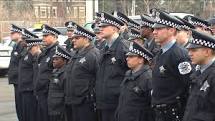Once again a young black man has been killed in a shooting by a Chicago police officer, and once again protesters are on the march.
It is wrong for anybody to jump to conclusions as to exactly what happened Wednesday night when 19-year old Kajuan Raye was shot and killed by an officer on the Southwest Side. How very unfair to presume to know just what went down. The shooting still is being investigated.
But the fatal encounter does put a spotlight once again on why every effort must be made to improve public confidence in the professionalism and integrity of the Chicago Police Department — and why it would be bad for Chicago if the new Trump administration were to put the brakes on long-overdue police reforms.
Trust in the police in Chicago already is low. Declining to hold officers to the highest standards and police practices only makes their jobs that much harder. To be fully effective, a police department must have the public’s trust and support.
Already, however, there is concern that the Justice Department under President Donald Trump will back off the civil rights probe of the Chicago Police Department that was begun last year after the release of video in the 2014 shooting of 17-year-old Laquan McDonald. A widespread expectation is that Trump, who won the support of major police unions during the presidential election, will appoint a U.S. attorney general, such as Sen. Jeff Sessions of Alabama, who cares little for such investigations and would slam to a close the effort here — after serving up a bland and toothless final report.
That would be a disservice to the people of Chicago, and to the police. The Justice Department’s current probe is essential to restoring trust in the CPD. Other cities that have entered into legal consent decrees after undergoing similar X-rays of police practices have seen an improvement in public confidence in law enforcement.
Equally worrisome for Chicago is the possibility that Trump’s Justice Department will put the kibosh on any investigation by the U.S. attorney’s office here into the shooting of McDonald by Officer Jason Van Dyke, the possible attempted cover-up by other officers and the possible complicity of other higher-ranking police officials.
Zachary Fardon, the U.S. attorney for the Chicago office, heavily implied in a recent City Club speech that his office is up for investigating these matters but is waiting to see the results of county prosecutors. The Cook County state’s attorney’s office, soon to be headed by Kim Foxx, has charged Van Dyke with murder, and a county grand jury is looking into whether other officers may have lied in their reports on the McDonald shooting.
The feds typically enter murder investigations and related cases only when state prosecutors have fallen down on the job. They serve as a kind of backstop. The feds, for example, pressed charges against the Los Angeles police officers who beat Rodney King in 1991 — an incident infamously caught on video — only after an all-white jury acquitted the officers.
But will Zach Fardon even be running the U.S. attorney’s office in Chicago a few months from now? Or will Trump’s Justice Department install a new top prosecutor in Chicago, one with little enthusiasm for crossing the local cops?
A third big potential reform in the next year, unrelated to anything Trump might do, also would go a long way toward improving public confidence in the police.
In June 2017, the city’s collective bargaining agreement with the Fraternal Order of Police will expire, which presents Mayor Rahm Emanuel’s team with an opportunity right now to negotiate changes in provisions that serve only to protect bad cops. The current contract provides for destroying misconduct records after only five years, prohibits investigators from following up on anonymous complaints against an officer, and allows an officer to wait 24 hours — one full get-your-story-straight day — before providing a statement after a shooting. The officer can even amend that statement later after viewing video or audio evidence.
Every Chicagoan should condemn the rush to judgment — either way — that occurs after every police-related shooting. How unfair to all involved.
Every Chicagoan should reject as well the twisted notion that our police cannot be aggressive and effective if held to the highest standards of integrity. What an insult to every good cop.
http://chicago.suntimes.com/opinion/editorial-how-trump-might-put-kibosh-on-chicago-police-reform/


